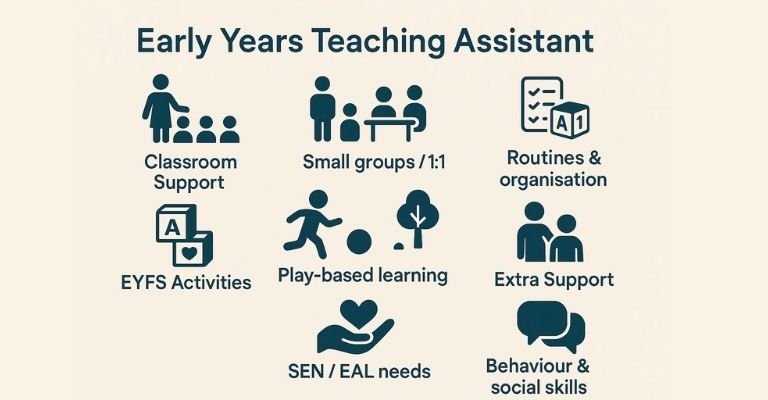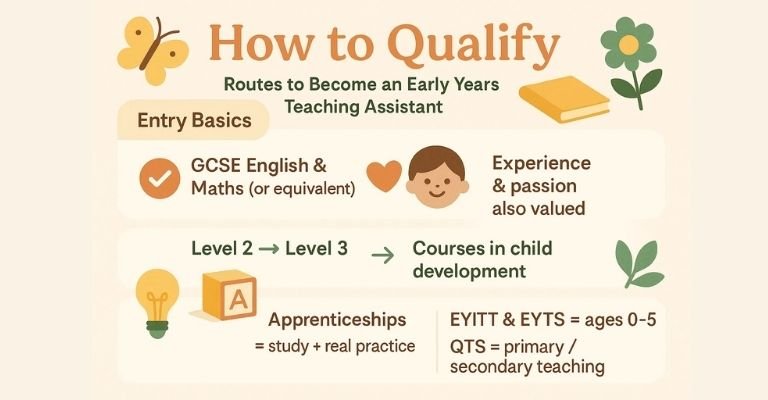No products in the cart.
An Early Years Teaching Assistant is the extra pair of hands (and heart) that helps little ones take their very first steps in learning. In fact, you’ll be right there in the classroom, supporting teachers, encouraging children, and celebrating those magical “lightbulb” moments.
It’s not just about tidying toys or handing out worksheets—instead, it’s about making sure every child feels safe, included, and excited to learn.
In this guide, we’ll walk you through what the role involves, the pay and hours, the checks you’ll need, and how to get started. Simple, friendly, and step by step.
Early Years Teaching Assistant
An early years teaching assistant plays an important role in nurseries, reception classes, and other EYFS settings. Through fun, play-based activities, an early years teaching assistant helps children learn, explore and enjoy new skills. Alongside teachers, they keep routines running smoothly and ensure the classroom feels safe and welcoming. At the same time, they observe progress so each child gets the support they need. Finally, an early years teaching assistant celebrates little achievements, helping children feel proud and excited to learn more.
What Does an Early Years Teaching Assistant Do?

Classroom Support (Small Groups, 1:1, Routines)
In the classroom, an early years teaching assistant helps children in small groups or one-to-one sessions. They assist with routines, organise resources, and create a calm, structured environment so every child feels safe and included.
EYFS Activities (Play-Based Learning, Phonics, Outdoor)
Through play-based learning, phonics, and outdoor activities, an early years teaching assistant encourages curiosity, creativity and teamwork. They make lessons engaging and fun while supporting skill development.
Support for SEN/EAL and Behaviour (Working with the Teacher)
When children need extra help, an early years teaching assistant works with teachers to support SEN, EAL, or behavioural challenges. Additionally, they adapt activities, offer guidance, and help build social and communication skills.
Skills You’ll Use Every Day
Working as an early years teaching assistant requires a mix of practical and personal skills that make a real difference in children’s learning.
- Patience: Staying calm when a child struggles with a task. For example, gently guiding a toddler through a tricky puzzle without rushing them.
- Communication: Explain activities clearly and listen carefully. For instance, helping a child to understand instructions during group play.
- Creativity: Making lessons fun and engaging. Such as turning a storytime into an interactive role-play activity.
- Organisation: Keeping resources ready and routines smooth. Like setting up stations for arts and crafts, so every child can participate easily.
- Teamwork: Supporting teachers and colleagues. For example, coordinating with a teacher to manage a small group activity while helping another child one-to-one.
These skills help create a safe, happy, and effective learning environment for every child.
How to Qualify: Your Route Options

Entry Basics (GCSE English/Maths or Equivalent)
To start as an early years teaching assistant, most jobs ask for basic English and Maths, like GCSEs. These help you understand instructions, support kids while they learn, and chat confidently with teachers and parents. Also, some nurseries care just as much about hands-on experience or a genuine love for helping children.
Level 2 → Level 3 Courses & Apprenticeships
Next, Level 2 and Level 3 courses teach you more about child development, classroom routines, and fun activities. Meanwhile, apprenticeships let you work in a nursery or reception class while you study. This way, you get real-life experience, build confidence, and see how teaching really works.
EYITT/EYTS vs QTS (The Quick Difference)
Finally, EYITT (Early Years Initial Teacher Training) and EYTS (Early Years Teacher Status) are for teaching little kids. Unlike QTS, which is for primary or secondary teachers, these focus on children aged 0–5. Plus, they give you the skills and confidence to lead activities, support other assistants, and help every child learn and grow.
Checks You’ll Need: DBS, Safeguarding & First Aid
Before starting as an early years teaching assistant, there are a few checks and training to help keep children safe. First, an Enhanced DBS check makes sure it’s safe for you to work with children. Next, safeguarding training shows you how to spot signs of harm and protect them. Also, a 12-hour paediatric first aid course teaches you what to do if a child has an accident. Finally, Prevent awareness helps you understand risks like radicalisation and how to keep children safe.
All these checks not only protect children but also give you confidence and show employers that you are caring and responsible.
Pay, Hours & Holidays—Made Simple
As an early years teaching assistant, pay depends on the school’s TA band. Usually, most roles are term-time only, so holidays match the school year. Hours include classroom support, small group sessions, and sometimes lunch duty.
It’s also important to know the difference between “full-time equivalent” (FTE) and actual salary. FTE shows what a full-year salary would be, while actual pay depends on the hours worked during term time.
Quick Example:
- FTE: £22,000 per year
- Term-time (actual): around £18,000
No Experience Yet? Start Here
Even without experience, you can start a career as an early years teaching assistant. For example, volunteering at a nursery or helping in a reception class gives you hands-on experience and a real feel for the job. At the same time, short placements let you see how classrooms run and how children learn. Also, keeping a simple log of what you do—like activities, challenges, and how you helped children—shows future employers your skills and dedication.
Tip: Every little experience counts, so celebrate what you achieve and enjoy learning along the way.
Where to Find Jobs & How to Read Adverts
Looking for a job as an early years teaching assistant can feel a bit tricky at first, but there are lots of options. To start, have a look at school websites, local council job boards, or nurseries nearby. Then, check out online sites like Indeed or childcare-specific job boards to find even more openings.
When reading job adverts, it helps to understand a few key phrases:
- “Level 2/3” means the qualification they want.
- “SEN experience” means supporting children with special educational needs.
- “First aid preferred” shows it’s helpful but not always required.
Finally, don’t worry if you don’t meet everything—they value enthusiasm, a love for children, and a willingness to learn just as much as formal experience.
CV & Cover Letter
Making a CV and cover letter doesn’t have to be tricky. Even if you’ve only done volunteering or short placements, it counts as real experience. Also, highlight things like helping kids, supporting teachers, or working with small groups. Show that you care and are enthusiastic—employers want to see both your skills and your heart.
CV Tips
- Helped children learn and play in small groups or one-to-one.
- Supported teachers with play-based activities, phonics, and outdoor learning.
- Assisted children with SEN or EAL, giving extra care.
- Created a safe, welcoming classroom for every child.
- Observed progress and celebrated milestones.
- Encouraged confidence, curiosity, and a love of learning.
Cover Letter Structure
- Introduce yourself and show excitement for the role.
- Highlight experience: volunteering, placements, or nursery work.
- Showcase skills: “play-based learning,” “child development,” “SEN support.”
- Explain why you’re a great fit: passion, teamwork, reliability.
- End positively: thank them and show enthusiasm for contributing.
Interview Prep
Getting ready for an interview as an early years teaching assistant can feel nervous but a little preparation helps a lot. First, think about common questions like:
- How would you handle tricky behaviour in the classroom?
- Can you share a time you supported a child with SEN or EAL?
- How do you keep children safe and follow safeguarding rules?
- How do you help children join in and enjoy activities?
Quick STAR Cheat Card
- S – Situation: What was going on? Set the scene.
- T – Task: What did you need to do? Your goal.
- A – Action: What steps did you take? Show your skills.
- R – Result: What happened in the end? Celebrate the outcome!
Remember, employers want to see your skills and your love for helping children, so let your passion show! This method helps you answer clearly and show your skills confidently.
Grow Your Early Years Career with CPD
Starting as an early years teaching assistant is just the beginning. Over time, you could move up to a Higher Level Teaching Assistant, focus on helping children with extra needs, or even run a nursery room. Also, doing EYITT or EYTS can help you move into teaching roles with young kids.
CPD (Continuing Professional Development) is important for growing your career. For example, free online courses, workshops, or just reading about child development and fun teaching ideas all help. By doing CPD, you keep learning, get more experience, and show that you really care about helping children do their best.
Boost your career faster with affordable, CPD-certified courses from Wise Campus:
- Level 4 Early Years Course – gain practical skills and deepen your knowledge.
- PGCE in Early Years Education – a step closer to a teaching role.
- Level 3 Award for Special Educational Needs Coordinators in Early Years Settings – specialise in SEN support.
Start today and grow your career with trusted, certified CPD courses!
Route-Finder
Starting a career as an early years teaching assistant can feel confusing, but this tiny path makes it simple:
- School-based job: Begin by helping in a nursery or reception class to get hands-on experience.
- Level 2 starter: Learn the basics of child care and early learning.
- Level 3 Early Years Educator (EYE): Take on more responsibility and deepen your skills.
- Apprenticeship: Work while you learn, gaining real classroom experience.
- EYITT/EYTS: Become fully trained to teach and lead learning in EYFS settings.
Each step builds your skills and confidence, helping you grow from a beginner to a trusted early years professional.
EYFS Terms
- Prime areas: The first important skills kids learn—talking, moving, and understanding feelings.
- Specific areas: Skills built on prime areas, like reading, counting, exploring the world, and being creative.
- Continuous provision: Learning resources that kids can use anytime to explore and play.
- Adult-led: Activities where the teacher plans and guides what children do.
- Child-initiated: Activities that the children choose themselves, following their curiosity.
- Phonics: Learning the sounds of letters to help kids read and write.
- EHCP (Education, Health & Care Plan): A plan to support children with special needs.
- EAL (English as an Additional Language): Children learning English alongside their own language.
- SEMH (Social, Emotional & Mental Health): Helping children manage feelings, behaviour, and emotions.
Tip: Knowing these terms helps you support children better and feel confident in the classroom.
FAQs
- What qualifications do I need?
GCSEs in English & Maths and a Level 2/3 childcare qualification.
- What does an early years TA do?
Supports teachers, helps children learn, and assists with routines.
- Can I be a TA with no experience?
Yes—volunteering or placements help you start.
- Can I be an early years teacher without a degree?
Some apprenticeships/EYITT routes allow training while working.
- Can a TA become a teacher?
Yes—with the right qualifications and experience.
- How much do nursery teachers earn per hour?
You’ll usually earn £10–£15 per hour, depending on experience and location.
Conclusion
Being an early years teaching assistant isn’t just a job—it’s a chance to help and cheer on little kids every day. Along the way, you’ll play with them, help them learn, pick up new skills, and feel more confident in what you do.
With some training, CPD courses, and hands-on experience, you can grow your career, support kids with extra needs, or even become a teacher. In the end, it’s a fun and rewarding path where you really make a difference in children’s lives.





